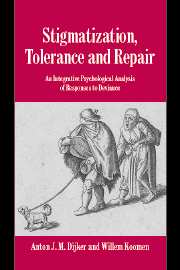Book contents
- Frontmatter
- Contents
- List of figures
- List of tables
- Preface
- Acknowledgments
- 1 Introduction
- 2 Evolutionary origins of social responses to deviance
- 3 Mental representations of deviance and their emotional and judgmental implications
- 4 Meeting individuals with deviant conditions: understanding the role of automatic and controlled psychological processes
- 5 Individual differences in responding to deviance
- 6 Variations in social control across societies, cultures, and historical periods
- 7 A focus on persons with a deviant condition I: their social world, coping, and behavior
- 8 A focus on persons with a deviant condition II: socio-economic status, self-esteem and well-being
- 9 Theorizing about interventions to prevent or reduce stigmatization
- Notes
- References
- Index
- Studies in Emotion and Social Interaction
1 - Introduction
Published online by Cambridge University Press: 22 September 2009
- Frontmatter
- Contents
- List of figures
- List of tables
- Preface
- Acknowledgments
- 1 Introduction
- 2 Evolutionary origins of social responses to deviance
- 3 Mental representations of deviance and their emotional and judgmental implications
- 4 Meeting individuals with deviant conditions: understanding the role of automatic and controlled psychological processes
- 5 Individual differences in responding to deviance
- 6 Variations in social control across societies, cultures, and historical periods
- 7 A focus on persons with a deviant condition I: their social world, coping, and behavior
- 8 A focus on persons with a deviant condition II: socio-economic status, self-esteem and well-being
- 9 Theorizing about interventions to prevent or reduce stigmatization
- Notes
- References
- Index
- Studies in Emotion and Social Interaction
Summary
Introduction
People are regularly confronted with a wide variety of features and behaviors in others that they may find undesirable or deviant, such as a bleeding wound, a missing leg, a harelip, depression, bullying, leprosy, cowardice, theft, unwillingness to work, low intelligence, or some threatening feature of a racial or ethnic minority or outgroup, to name only a few examples. Different deviant conditions may evoke different kinds of responses. For example, individuals who display selfish behavior such as hurting others, stealing property, or lack of motivation to cooperate, tend to be punished; others who are incapable of cooperating and contributing to group life due to illness or injury, usually receive care and medical treatment; and still others with abnormal facial features, may primarily evoke fear and avoidance rather than punishment or care and protection. Furthermore, the same deviant condition may also trigger widely different responses in different situations, historical periods, and cultures, ranging from extreme moral outrage and harsh physical punishment to “softer” treatment and forgiveness, and from extreme tenderness and care to “less soft” and more aggressive and authoritative forms of nurturance and therapy. Pretending not to be affected by a particular deviant condition, and the suppression and indirect expression of one's emotional reactions to the condition, or the consistent avoidance of a deviant individual in order to prevent experiencing these emotions, may be considered as further variants of how individuals respond to deviance.
- Type
- Chapter
- Information
- Stigmatization, Tolerance and RepairAn Integrative Psychological Analysis of Responses to Deviance, pp. 1 - 23Publisher: Cambridge University PressPrint publication year: 2007



